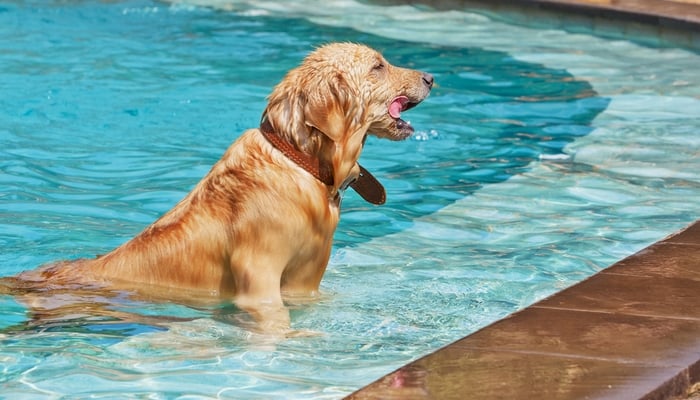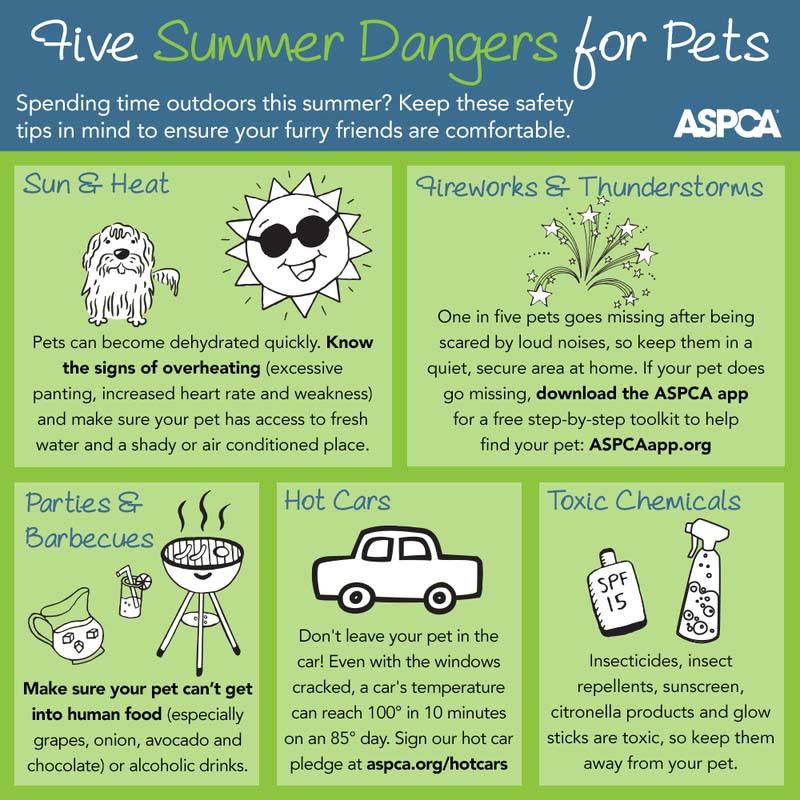When we’re out at the beach or enjoying our scenic rivers and lakes, it’s fairly common to see dogs out enjoying our wonderful waterways along with their beloved owners. But for some specific dog breeds and other unique circumstances, splashing around and swimming with our pets can be dangerous. There are numerous pool dangers for dogs that you need to be aware of in order to keep your pet safe this summer.
For dogs that are susceptible to Brachycephalic Airway Syndrome (or BAS), the shape of their head and snout can make swimming difficult or even deadly. It’s believed that many dogs with BAS have acquired this condition from over-breeding. Some of these breeds include bull terriers, pugs and boxers.
As humans seek to have canines with shorter snouts, broader foreheads and flattened faces, this has created breathing difficulties and other problems with the development these types of dogs. Other breeds don't care much for the water either. It's not just your pet's physical features that can effect his safety in the pool.
RELATED: Dogs in Pools and Why Swimming is Good for Your Pet
Dog Paddle 101: Lesser Known Pool Dangers For Dogs
Dog Out Of Water
While we’re all having a good time splashing around and swimming underneath the summer sun, sometimes we forget about the surfaces that surround our pools. Concrete and red bricks, commonly seen and installed poolside, can become stinging dangers underneath the sun’s powerful rays.
I’m sure you’ve heard the expression, “it’s so hot out there, you could fry an egg on the sidewalk,” and the same is true for the cement and other materials that surround many swimming pools.
Research has shown, that on an average summer day, when the mercury rises to 95℉, the temperature of cement or concrete surfaces reaches a stinging 125℉ and red brick borders can come in at a blistering 135℉. At these rates, they can be painful and cause injuries to their sensitive paws.
Be sure that pets don’t spend an inordinate amount of time outside around the pool. Whether they’re swimming or not, be sure they have a comfortable spot in the shade to relax and unwind along with a blanket, pad or another cool surface to relax away from the pool.
RELATED: How to Prepare Your Dog for Summer
Barbeque Bans
Nothing says summer like a backyard barbeque, especially near the swimming pool. But this fun-filled event can come with some hidden dangers for our wandering canines.
Think of a toddler running around with a delicious barbequed chicken leg or a wing that can easily be snagged by a passing pooch. We all know that chicken bones can splinter and cause a number of different internal injuries for a dog.
Here are some other things we should all be on the lookout for during our family friendly cookouts:
- Trash Receptacles – Ensure all outdoor trash cans come accompanied with a tightly fitting lid so Fido doesn’t help himself to some free leftovers that could cause stomach distress and many other unforeseen dangers for our dogs.
- Food Lying Around – Same as above. For some dogs, they could have allergies, other adverse reactions or side-effects after consuming human food at any level, whether it was a simple nibble or a feast occurring on a leftover plate left unattended.
- Fruit Salad – Fresh fruit salads, commonly found at these cookouts can be a healthy treat, especially watermelon, but their seeds are unhealthy for all animals. Grapes and raisins are also toxic, along with nuts, especially macadamia, which can cause a number of health hazards.
- Chips & Dips – These popular side dishes are omnipresent at any summer cookout, but they can present a variety of different dangers for dogs. Aside from the high salt content found in chips, their accompanying dips may contain avocado, garlic, onions and a variety of other ingredients that contain certain toxins that are dangerous or deadly for pets.
- Desserts – We all know that chocolate is hazardous for a dog, but some sugar free dessert choices can contain xylitol that can be fatal for a pet, even if consumed in small doses. Just one bit of this sweetening ingredient can be toxic or even deadly for a dog.
- Fireworks – Aside from food, fireworks, a popular celebratory favorite, are often disliked by dogs due to their ear-piercing sounds and devastating explosions. But the taste or scent of them can be even more dangerous.
As many of us know, dogs will put practically anything into their mouths, and if these are left lying around after use, they could be easily be smelled or consumed by a curious canine. Full of toxins and poisons, be sure these are safely disposed of before a dog can come in contact with them.
RELATED: 5 Best Pool Floats for Dogs to Swim On
Surface Suffrage
At these hotter levels, coming into contact with these overheated play areas not only cross the threshold of pain, but it can also cause some serious injuries.
For example, at 120℉ contact with these surfaces becomes painful to the skin, but at an increase to 140℉, injuries, burns, scarring and permanent damage are possible after just one minute.
While it’s not necessarily a pool-time tip, the same warning rings true when it comes to walking our dogs on these hot surfaces. Black asphalt is even more dangerous at an exterior temperature of the same degree (95℉), this common roadway surface rises to a torturing 140℉. Unless you’ll be walking barefoot with your best friend, consider at least feeling the surface before you take a stroll.
While we’re all aware of dangerous, more common heat-related situations when it comes to the care of our beloved canines, like leaving them in a hot car, other perils are often overlooked. Check out this infographic below for other tips on having a safe and sane summer with our four-legged friends and family around the pool.

















